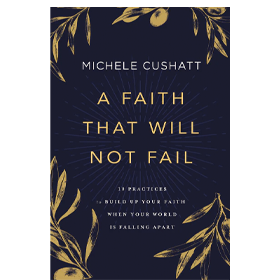 By Michele Cushatt
By Michele Cushatt
Therefore everyone who hears these words of mine and puts them into practice is like a wise man who built his house on the rock. The rain came down, the streams rose, and the winds blew and beat against that house; yet it did not fall, because it had its foundation on the rock.
—Matthew 7:24–25
Before his death, Jesus dined with His disciples. It was Passover, the annual feast to remember Yahweh’s deliverance of the Israelites from Egypt after hundreds of years of slavery. (See Exodus 11 and 12.) To those seated at the table, it was simply another Jewish celebration. Jesus knew otherwise.
This would be the Passover to which all the other Passovers had pointed. He would be the lamb sacrificed, His blood providing cover and allowing the sentence of death to pass over God’s people, setting us free from our slavery to sin.
I’ve tried to imagine what that night must’ve been like for Jesus, agonizing over His upcoming suffering while also preparing the disciples for theirs. For three years, He’d poured into them, teaching and mentoring them. And yet they still didn’t grasp what was about to take place. They didn’t understand that their hopes were about to be hung on a cross. Instead, like teenagers vying for popularity, they argued about who was the greatest (Luke 22:24).
Which is why, I believe, Jesus turned to Simon Peter, a leader among them, with a few pointed words:
“Simon, Simon, Satan has asked to sift all of you as wheat. But I have prayed for you, Simon, that your faith may not fail. . . .”
But he replied, “Lord, I am ready to go with you to prison and to death.”
Jesus answered, “I tell you, Peter, before the rooster crows today, you will deny three times that you know me.”
—Luke 22:31–34
For much of the last several years I’ve thought about this scene. Later that night, Peter faced his own crucible. Passionate but overly confident, he thought he was ready for the worst. He couldn’t have been more wrong.
Jesus could see what Peter couldn’t. Peter’s good intentions would fail him long before he fled that night’s garden. Which is why what happened next is so important.
Hidden in Jesus’ poignant words to a perplexed Peter sit two extraordinary gifts.
First, a warning. “Satan has asked to sift all of you as wheat.”
Oof. Talk about bad news. It’s not every day you hear the devil is about to eat you for lunch.
And second, a promise. “I have prayed for you, Simon.”
Whoa. Let that sink in. Jesus, the one Peter had declared to be “the Messiah, the Son of the living God” (Matthew 16:16), prayed for the man who would, before the end of the night, deny he ever knew Him. Long before the shock of Jesus’ arrest shattered Peter’s confidence, long before he tucked tail and fled in fear, long before he sat around a community fire and told accusing onlookers, “I don’t know the man!” (Matthew 26:74), yes, long before Peter failed, Jesus prayed.
Peter’s spiritual sifting wasn’t a war that would be won by confidence or even the wielding of a sword. Instead, Peter needed the fortifying prayers of the Savior.
A warning (bad news). And a promise (ridiculously good news).
Jesus had all of His Father’s power and authority at His fingertips. He could’ve called down fire and lightning or weapon-wielding angels, or even wrapped Peter in bubble wrap. Of all the things Jesus could’ve done to mitigate Peter’s pain, He prayed.
He didn’t pray for Peter’s health, his family, his finances, or even his ability to fight back and escape arrest and death.
Instead, Jesus prayed for his faith.
In our places of suffering, we believe what is most at stake are our relationships, family, safety, financial security, health, or even our very lives. We think the diagnosis, divorce, or death is the worst that could happen.
We couldn’t be more wrong.
My Faith Journey
Storms are a universal part of the human experience. No one escapes suffering or the day-to-day wear and tear on our human existence. “He causes his sun to rise on the evil and the good, and sends rain on the righteous and the unrighteous,” Jesus reminds us (Matthew 5:45). And “in this world you will have trouble,” He warns (John 16:33).
Although our choices impact our path, we can’t control the weather as we walk it. And just as weather reveals the stability of a home, suffering exposes the status of a person’s faith.
Yes, I’m often asked how I can still believe after all I’ve endured. How did I survive so much suffering with my faith still intact? Here is my two-part answer. First, like Peter, I take no credit for the faith that still grounds and guides me. As John Newton wrote in the lyrics of his now-famous hymn, “Amazing Grace”:
Through many dangers, toils and snares
I have already come:
’tis grace has brought me safe thus far,
and grace will lead me home.
And second, although the grace of my Father carries me still, my years of following Jesus provided a foundation that helped me weather the worst life had to offer. As Bible teacher Jen Wilken says, “Spiritual disciplines nurture steadfastness. What we repeat in times of ease we will recall in times of hardship.”
Like Peter, I’ve long been a disciple, albeit a poor one. I’m well intentioned but weak, at times overconfident and impulsive, and often underprepared. Although I love Jesus, I often fail Him. Even so, following Jesus has taught me practices that proved firm. Like a slow and steady renovation, these practices strengthened me a little at a time so that, when the storms came, my faith remained.
You may not have the same history with Jesus that I do. Some of you have journeyed much longer than I have, and others of you are just starting out. For those with an impressive Christian resume, don’t mistake a devout life for a devoted love. It is possible to check all of the religion boxes and still miss out on real faith. The first is about performance; the second is about relationship.
And to those new to this Jesus thing, don’t equate your lack of spiritual experience as weakness or, worse, a lesser love. Jesus said, “Truly I tell you, unless you change and become like little children, you will never enter the kingdom of heaven” (Matthew 18:3). Although your faith is new, you are uniquely able to approach Him without the arrogance that often accompanies religious performance.
Come as you are. He’s already head over heels for you.
________
 Taken from A Faith That Will Not Fail: 10 Practices to Build Up Your Faith When Your World Is Falling Apart by Michele Cushatt. Click here to learn more about this book.
Taken from A Faith That Will Not Fail: 10 Practices to Build Up Your Faith When Your World Is Falling Apart by Michele Cushatt. Click here to learn more about this book.
Beloved author and Bible teacher Michele Cushatt offers ten practices to strengthen your confidence in God’s daily presence and power and build a faith strong enough to endure even the toughest seasons.
Life can be hard. Although there are moments of beauty and goodness, more often than not, life is marked by fear, struggle, disappointment, and loss. And we don’t know what to do with it. We’ve tried to find hope and security in various people and places—but each has proved unworthy of our trust. We need more. Something—or Someone—who won’t fail us when our world falls apart.
In this book, beloved author and Bible teacher Michele Cushatt presents a better way. By exploring powerful personal, historical, and biblical stories of people of extraordinary faith, she curates and shares ten practices to help you deepen your confidence and certainty in the God who can be trusted with your worry, questions, confusion, and grief. As a woman who has been through immeasurable suffering, she writes with both deep compassion and practical insight as she guides you to:
- Practice lament and process grief without guilt or shame
- Understand what keeps you from trusting God and how to navigate doubt with truth
- Learn simple ways to foster shalom and gratitude on a daily basis
- Develop a fresh, eternal perspective that delivers both peace for today and hope for tomorrow
- Savor daily “faith-builder” practices to strengthen your confidence in God’s love and purposes for you, no matter what happens
There is hope in your hardship and a God who is both with you and for you. These ten practices point the way to the only One you can truly trust, and ultimately, to a faith in him that will not fail.
Michele Cushatt speaks internationally to a wide variety of audiences and has published three previous books, including Undone and I Am. A three-time head and neck cancer survivor and parent of “children from hard places,” Michele is a (reluctant) expert of trauma, pain, and the deep human need for authentic connection and enduring faith. She and her husband, Troy, share a blended family of six children, including biological children, stepchildren, and foster-adopt children. They live on eight acres outside of Denver, Colorado. For more information, visit MicheleCushatt.com.
Looking for More?
Sign up today for the Zondervan Books Growth monthly email newsletter and receive the PDF eBook A Spectacle of Glory: The First 28 Days by Joni Eareckson Tada, taken from Joni’s devotional A Spectacle of Glory: God’s Light Shining through Me Every Day.
Each month you’ll receive an email with a deal, a feature article, and book samples designed to help you find more incredible books for your reading and listening lists.
________
The post A Faith Lesson from Peter’s Denial of Jesus appeared first on Bible Gateway Blog.









